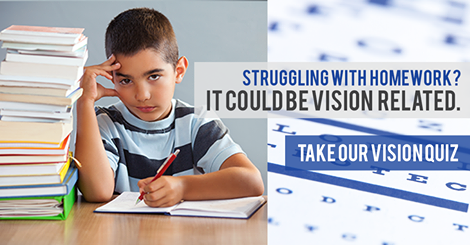 Have you ever wondered if your child’s difficulties with attention and learning have to do with more than just ADD/ADHD? It's not uncommon for vision problems to be mistaken for attention-related problems, leading to frustration and a lack of academic progress. That's where vision therapy comes in.
Have you ever wondered if your child’s difficulties with attention and learning have to do with more than just ADD/ADHD? It's not uncommon for vision problems to be mistaken for attention-related problems, leading to frustration and a lack of academic progress. That's where vision therapy comes in.
At Coleman Vision in Joplin, MO, we understand the importance of identifying the root cause of these challenges. In this blog post, we'll explore the signs that may indicate whether your child’s struggles are linked to ADD/ADHD or if a vision problem might be at play. Let's dive in and discover where and how vision therapy can make a difference!
Signs that Point Towards Vision Issues
-
Difficulty with Reading and Comprehension
If your child consistently struggles with reading, comprehension, or maintaining focus during reading tasks, it could be more than just a simple case of attention difficulties. Vision problems like eye teaming, tracking, or focusing issues can make it challenging to process and understand written text.
-
Frequent Reversals and Letter/Word Confusion
Mixing up letters or words, writing letters or numbers backward, or having trouble with spelling could indicate underlying vision issues. These difficulties can hinder academic progress and may be mistaken for ADD/ADHD symptoms.
-
Eye Strain and Fatigue
Does your child often experience eye strain, headaches, or feel excessively tired after reading or performing close-up tasks? These symptoms can be a result of underlying vision problems, such as difficulty adjusting focus (accommodative dysfunction). Addressing these issues through vision therapy can significantly improve comfort and performance.
-
Poor Hand-Eye Coordination
Difficulties with hand-eye coordination, such as challenges with catching or throwing a ball, playing sports, or completing delicate motor tasks, may be indicative of visual processing deficits. Vision therapy aims to enhance these skills, leading to improved coordination and overall functioning.
Differentiating ADD/ADHD from Vision Problems
It's important to note that vision problems can sometimes mimic ADD/ADHD symptoms. However, there are certain signs that can help differentiate between the two:
1. Consistency Across Settings
ADD/ADHD symptoms typically persist across various environments, such as school, home, and social settings. Vision-related difficulties, on the other hand, may be more pronounced during specific visual tasks or when visually demanding activities are involved.
2. Vision-Specific Symptoms
If you notice your child’s difficulties primarily revolve around visual tasks, such as reading, writing, or focusing on visual stimuli, it suggests a potential vision-related issue. Addressing these symptoms through vision therapy can lead to significant improvements in performance and attention.
3. Response to Medication
While medication may help manage ADD/ADHD symptoms, it may have little to no effect on vision-related challenges. If your child experiences limited improvement in visual tasks despite medication, it may be an indication that vision therapy is necessary to address underlying vision problems.
How Vision Therapy Helps
Vision therapy is a type of eye training that aims to improve specific visual skills and abilities. Think of it as physical therapy for the visual system. While vision therapy does not directly treat ADHD, it can have a profound impact on visual abilities, making learning and daily tasks much easier for individuals with these conditions.
Here's how it can help your child’s vision, and by extension, academic development:
1. Improving Visual Skills
Vision therapy ivolves targeted exercises to enhance essential visual skills such as contrast sensitivity, eye teaming, focusing, hand-eye coordination, perception, and tracking. These exercises specifically target areas of visual processing that may be affected in individuals with ADHD or learning disabilities, addressing their challenges and improving visual abilities.
2. Enhanced Eye Coordination
If your child has crossed eyes (strabismus), for example, vision therapy may involve exercises that focus on a pencil, moving it closer and farther away from the face. These exercises train the eyes to work together effectively, improving eye coordination and enhancing visual performance.
3. Personalized Treatment Plans
Vision therapy begins with a functional visual evaluation that assesses visual acuity, lazy eye, and other visual skills that aid in learning and development. If any visual skill deficits are identified, a customized vision therapy plan is created. This may involve wearing an eye patch, using prisms, or engaging in targeted eye exercises to strengthen and improve visual abilities.
Vision Therapy in Joplin
Remember, when it comes to ADD/ADHD, vision therapy can be a game-changer for your child and you can trust the experts at Coleman Vision, Joplin, to guide them toward a brighter future where they can thrive academically, socially, and visually.
Schedule a functional visual evaluation today to discover the potential of vision therapy.
